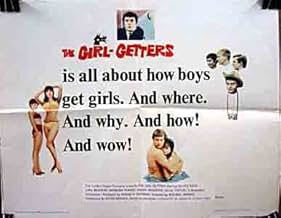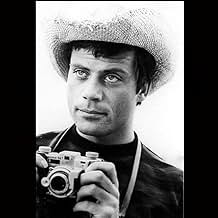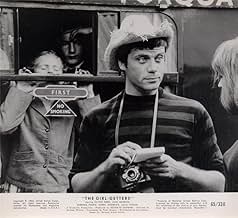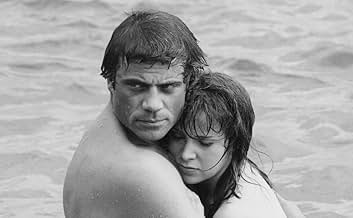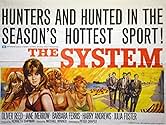IMDb RATING
6.6/10
938
YOUR RATING
In a seaside town, local men pursue summer tourists for casual flings. Their leader, a photographer named Tinker, unexpectedly falls for a wealthy model, realizing the dynamic of exploitatio... Read allIn a seaside town, local men pursue summer tourists for casual flings. Their leader, a photographer named Tinker, unexpectedly falls for a wealthy model, realizing the dynamic of exploitation may be reversed.In a seaside town, local men pursue summer tourists for casual flings. Their leader, a photographer named Tinker, unexpectedly falls for a wealthy model, realizing the dynamic of exploitation may be reversed.
John Porter-Davison
- Grib
- (as John Porter Davison)
Gwendolyn Watts
- First Class Girl
- (as Gwendoline Watts)
Stephanie Beaumont
- Marianne
- (uncredited)
Victor Brooks
- Club Manager
- (uncredited)
Susan Burnet
- Jasmin
- (uncredited)
Jeremy Burnham
- Ivor
- (uncredited)
- Director
- Writer
- All cast & crew
- Production, box office & more at IMDbPro
Featured reviews
A neglected but in its unassuming way very well-made little melodrama by a young Michael Winner, shot mainly on location around Torbay right at the start of the Swinging Sixties era. Fairly racy in its day, it never tries to sensationalise its premise that casual sex is as normal as the twist among the holidaying young people.
The cast is exceptional. This was Winner's first collaboration with Oliver Reed, whose charisma and aura of watchful menace here is unmistakable. There was never another star in British cinema quite like him. Jane Merrow is just as excellent as the sympathetic but ultimately unattainable Nicola; she makes the character totally three-dimensional without any histrionics. Barbara Ferris also stands out among a talented young cast, especially in her final stoned lament at the evening beach-party.
Winner is helped immeasurably by a brilliant cinematographer, Nicolas Roeg (here in between lensing such notable Brit-flicks as The Caretaker, Nothing But the Best and Masque of the Red Death). His location work right from the title sequence gives a vivid sense of place of a jaded seaside resort in the last days of summer.
Directorial flair is surprisingly confident, borrowing just enough new-wave technique to languidly establish the film's youth pedigree without ever indulging in obtrusive effect for its own sake.
Winner's previous film, West 11, a lowlife murder suspensor, also made good use of a mainly young cast. After The System he moved on to bigger but not necessarily better things before Hollywood swamped what talent he had. A pity, because this film, never acknowledged as being one of the best British b-films of the time, really is pretty good.
The cast is exceptional. This was Winner's first collaboration with Oliver Reed, whose charisma and aura of watchful menace here is unmistakable. There was never another star in British cinema quite like him. Jane Merrow is just as excellent as the sympathetic but ultimately unattainable Nicola; she makes the character totally three-dimensional without any histrionics. Barbara Ferris also stands out among a talented young cast, especially in her final stoned lament at the evening beach-party.
Winner is helped immeasurably by a brilliant cinematographer, Nicolas Roeg (here in between lensing such notable Brit-flicks as The Caretaker, Nothing But the Best and Masque of the Red Death). His location work right from the title sequence gives a vivid sense of place of a jaded seaside resort in the last days of summer.
Directorial flair is surprisingly confident, borrowing just enough new-wave technique to languidly establish the film's youth pedigree without ever indulging in obtrusive effect for its own sake.
Winner's previous film, West 11, a lowlife murder suspensor, also made good use of a mainly young cast. After The System he moved on to bigger but not necessarily better things before Hollywood swamped what talent he had. A pity, because this film, never acknowledged as being one of the best British b-films of the time, really is pretty good.
You might think that by 1964 the world was all swinging sophistication, but no it was like this, I remember. I had recently started working, in a bank. It was hand written ledgers and an outside toilet! Yep, life revolved a fair bit around getting girls and then making sure you didn't get them pregnant and then 'having to get married'. Everyone is s bit too old here, of course, although David Hemmings looks like a little angel. Oliver Reed puts in a good performance as the leader although it's hard at the end to take his more introspective ponderings. Great direction by Michael Winner, there not many people have said that, and the movie speeds along with some excellent sequences, especially the wedding celebration on the beach, played more like a wake. Winner is an under rated director, he did a couple of others of this ilk, then I like his Innocents and there is Death Wish. I liked the hated Death Weekend but in general his career went downhill and it stops people giving the earlier films a chance. Well worth watching, if only to appreciate that the mid 60's in Britain were still much like the 50's, except with teenagers.
When I saw " The System " for the first time I was about 14 years of age,and had never heard of Oliver Reed or David Hemmings.By today's standards it is hardly very shocking or thrilling;and yet in 1964 it was rather risqué,being about young men who were essentially trying to get young ladies into bed.It is filmed in black and white,and has a young and very handsome Oliver Reed seducing young ladies,but eventually falling in love.It also has a young David Hemmings,who later goes on to make some of the more memorable films of the 60's.It has many quality performances from British character actors, such as Juliette Foster and John Alderton.It also is directed by the very underrated Michael winner,and is worth viewing for its cinematographic interest,but also for its particular take on the 1960's.
I first saw this film when it was released (in 1964) and it had a profound effect on me then, imagine my surprise when I saw it in the middle of the night on TV a few days ago and it hasn't lost any of it's freshness. Oliver Reed is brilliant, as he always was before he took to the bottle, and the idea of the girl turning the tables on the cock-sure man is executed magnificently. Furthermore the quote that I remember for forty years still rang true (Harry Andrews, a photographer, says "we're here to make memories" and Oliver Reed's reply "I thought we were here to make money"). People may laugh at Michale Winner now but this was god, very good. Even today.
Whenever you question the quality of both Michael Winner and the late Oliver Reed's films in recent years don't judge them until you go back to the sixties where they both started out.
Here is a very low budget and rarely seen little movie that shows both the potential of both star and director.
Made two years before Michael Caine's ALFIE, THE SYSTEM takes a look at similar themes, having a good time while you're young and pulling birds. It is of course seen through the eyes of the male perspective as Ollie and pals Andrew Ray, John Alderton and David Hemmings go on a sexual rampage in a seaside town of Britain.
Winner helped launch the career of Oliver Reed and they worked together again several times throughout the sixties but this early piece of nostalgic British cinema is worth a look especially if you were a teenager in the early sixties.
Here is a very low budget and rarely seen little movie that shows both the potential of both star and director.
Made two years before Michael Caine's ALFIE, THE SYSTEM takes a look at similar themes, having a good time while you're young and pulling birds. It is of course seen through the eyes of the male perspective as Ollie and pals Andrew Ray, John Alderton and David Hemmings go on a sexual rampage in a seaside town of Britain.
Winner helped launch the career of Oliver Reed and they worked together again several times throughout the sixties but this early piece of nostalgic British cinema is worth a look especially if you were a teenager in the early sixties.
Did you know
- TriviaJane Merrow replaced Julie Christie who was unavailable.
- GoofsThe film begins with two of the main characters racing to catch a train, a 3 car DMU. They manage to board the train, but once aboard and talking to a ticket inspector, they are now in a corridor carriage and not a DMU car.
Later the train is shown at Dawlish, by the sea, hauled by a Class 42 or 43 loco. So, clearly not a DMU.
Finally the train arrives at Roxham. The train is now hauled by a Class 22. Visually quite different from a Class 42/43. And certainly not a DMU.
- ConnectionsReferenced in For the Love of Movies: The Story of American Film Criticism (2009)
- How long is The Girl-Getters?Powered by Alexa
Details
- Runtime
- 1h 33m(93 min)
- Color
- Aspect ratio
- 1.78 : 1
Contribute to this page
Suggest an edit or add missing content


